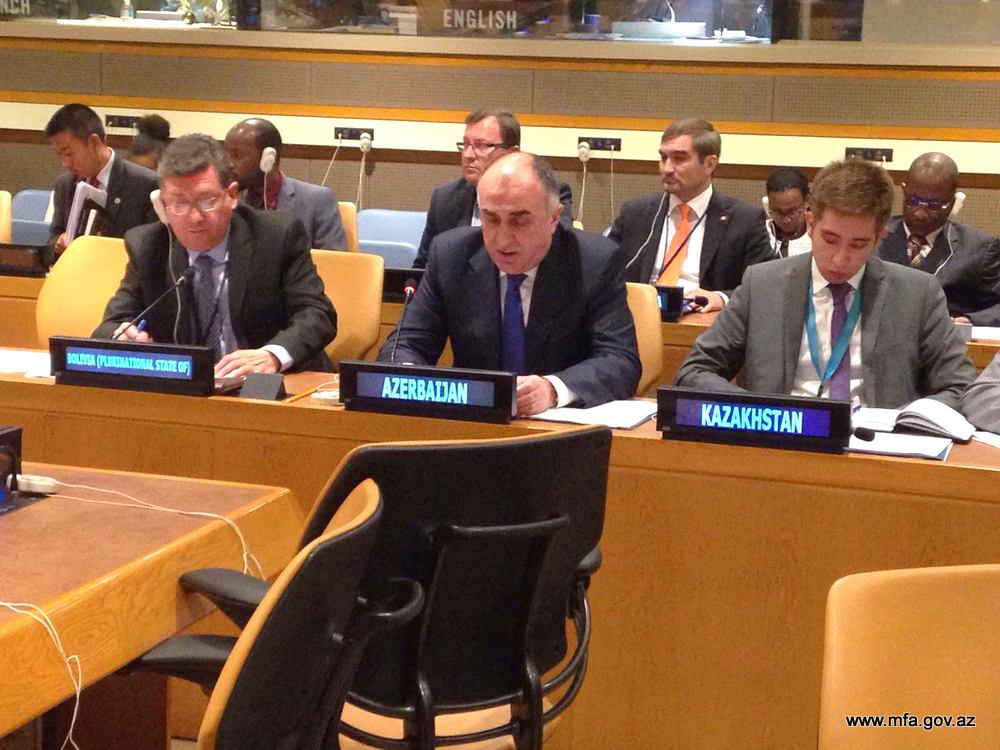Statement by Foreign Minister Elmar Mammadyarov at the 15th annual ministerial meeting of the group of the landlocked developing countries (LLDCs)
Statement by Elmar Mammadyarov, Minister of Foreign Affairs of the Republic of Azerbaijan at the 15th annual ministerial meeting of the group of the landlocked developing countries (LLDCs) on the theme of “Harnessing coherence in the implementation of the 2030 agenda for sustainable development and Vienna Programme of Action”
22 September 2016, New York
Honorable Ministers,
It gives me indeed a great pleasure to participate at this 15th annual ministerial meeting of the group of the LLDCs and deliver a statement on behalf of the Republic of Azerbaijan in front of such a distinguished audience.
With the aim of timely and effective achievement of the Sustainable Development Goals (SDGs) and implementation of post-2015 sustainable development agenda, Azerbaijan continues to successfully implement its sustainable development strategy, entitled “Azerbaijan 2020: vision for the future”, and a strategic roadmap for national economy and its major sectors that will ensure country’s smooth transition from a traditional economy to more diversified, competitive, resilient, as well as innovative, technology-rich and knowledge-based economy.
In this context, Azerbaijan attaches high importance to the implementation of the Vienna Programme of Action for LLDCs to ensure country’s sustainable development and efficient integration into the global economy, as well as to break into strategic markets.
Despite global economic crisis and sharp drop in oil prices and continuing occupation of around 20 percent of the territories of Azerbaijan by neighboring Armenia, as a result of which almost 1 million people became refugees and IDPs, my country has managed to retain its growth dynamics last year. In 2015, the non-oil industry grew by 8.4%. In 2015, foreign trade turnover of my country was more than USD 20 billion and the number of trading partners of Azerbaijan reached 165 countries thanks to successful reforms on trade facilitation and transit-related measures, as well as ongoing development of sophisticated transport, ICT and energy infrastructure.
Located at the crossroad of East-West and North-South international transport corridors, Azerbaijan has managed to become a pioneer in the region in initiating and enabling a number of strategic trans-regional transport, ICT and energy projects such as Baku-Tbilisi-Kars railway link, the new Baku International Sea Trade Port, Trans-Eurasian Information Super Highway and Southern Gas Corridor, consisting of Trans Adriatic Pipeline, Trans Anatolian Pipeline and South Caucasus Pipeline. Due to its advantageous geostrategic location, strong transit potential and serving as the economically efficient and shortest route for connecting Europe and Asia, Azerbaijan continues to contribute to the inter and intra-regional trade and overall sustainable development of the Eurasia region by offering multitude of favorable transport opportunities.
Azerbaijan is interested in further strengthening the trans-regional connectivity in sustainable transport. Baku-Tbilisi-Kars railway link, expected to be fully operational in 2017, has a strategic importance for the region and will be able to provide competitive link for the passenger and container shipping and increase the volume of multimodal transportation across Eurasia, as well as cargo flows from Asia to Europe and vice-versa. Moreover, Azerbaijan, Kazakhstan and Georgia are interested in attracting more cargo flows through Trans-Caspian International Transport Route in the near future and therefore agreed to establish the International Trans-Caspian Transport Consortium in April 2016.
Being at the very heart of North-South transport corridor, Azerbaijan enables transit of goods from the Persian Gulf to Russia and to Europe via the Black Sea. We are also actively engaged in the relevant multilateral processes aimed at further development of the North-South corridor.
The new Baku International Sea Trade Port Complex, striving to become the leading trade and logistics hub in the wider region, will play a key role in transportation of goods both by North-South and East-West international transport corridors, act as a vital transit point within TRACECA project and lead to expanding inter and intra-regional trade with the capability to accommodate the transit cargo deliveries between Asia and Europe. Series of international carriages, originating from China and passing across the Caspian Sea, were carried out via the very Port which proved its efficiency in terms of diminishing delivery time and transportation costs.
With the aim of further ensuring smooth flow of transit goods through Azerbaijan by rail and maritime transport, via ports and marine terminals, the National Coordinating Council on Transit Freight was established in October 2015.
Besides, free trade zone type special economic area to be established in the country represents yet another element of Azerbaijan's policy to strengthen the country's position as a regional logistics and transportation hub and create a multi-vector transport infrastructure.
Azerbaijan also emerges as an important ICT transit hub of the region, especially through the perspective implementation of UN General Assembly-supported Trans-Eurasian Information Super Highway (TASIM) project which will help to build broadband connectivity, promote development of ICT infrastructure and e-commerce across Eurasia and will further contribute to UN’s bridging the digital divide initiative.
Azerbaijan has been successful in becoming one of the key players and investors in energy infrastructure projects in the South Caucasus region and beyond. Through initiating and implementing sustainable energy projects Azerbaijan has established itself as a reliable energy supplier and become a vital bridge between Asia and Europe. Currently, we are an enabler of the Southern Gas Corridor which will not only contribute to the regional energy security, but also will provide new opportunities for other energy producers.
Azerbaijan is ready to share its relevant experience, especially on public administration, single window in customs and tax system, socio-economic reforms, with other LLDCs and also relies on their interest and cooperation in further strengthening trans-regional connectivity aimed at addressing existing sustainable development challenges of our countries, as well as meeting SDGs.
I thank you.

